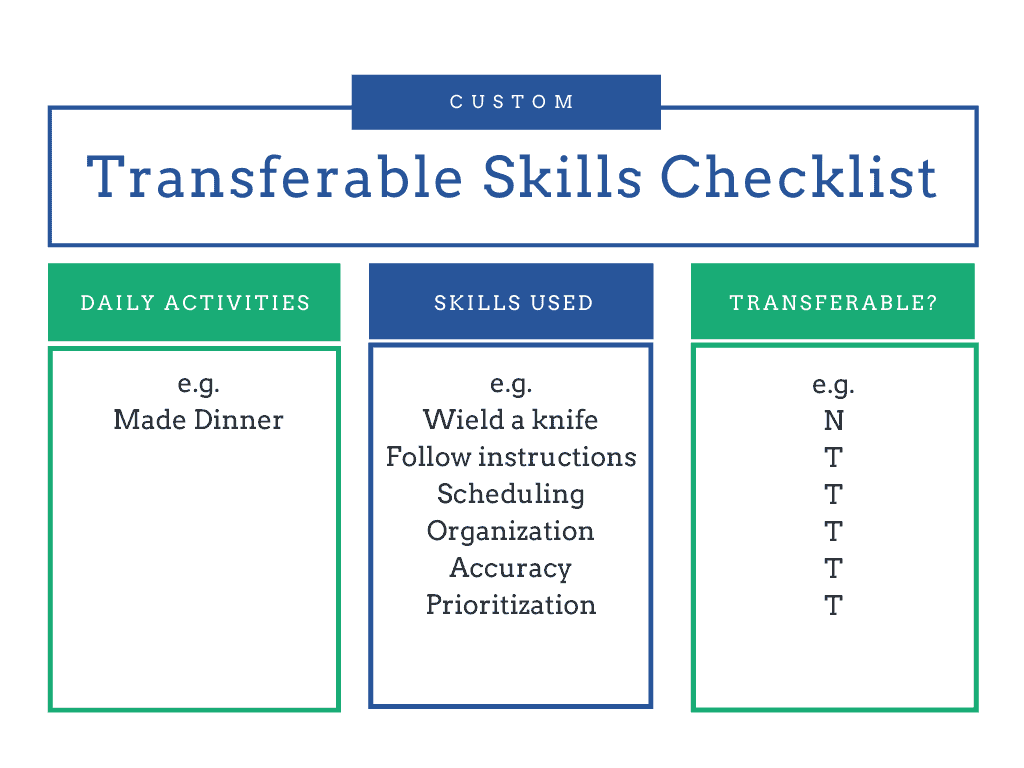Online checklists don’t help you stand out from the crowd.

Have you ever felt stuck in your job? Or you’re thinking about growing in your career, but you’re not sure which direction to go in?
You might be thinking “can I actually switch my career?” or “how do I take my career to the next level?”
If so, you have probably thought about your transferable skills. In fact, you may have found one of those handy-dandy online lists!
But here’s the thing… everyone uses identical lists and they pull out a few skills that “sound good”. They pick the ones that employers “want” to hear. It’s a trap!
You end up blending into the crowd of applicants. And even worse, you have missed an opportunity to better understand your own abilities!
So what actually are transferable skills?
Transferable skills are the day-to-day things that you do well. They are learned throughout your lifetime and can be applied in a variety of scenarios.
I often hear that thinking about “transferrable skills” is overwhelming, confusing and restrictive. It can feel so concrete. So defined. So limiting.
And yet, if you are a human (since you are reading this, there is a good chance that you are)… your list of transferable skills should be as unique as you are.
Knowing your transferable skills gives you options and direction.
It’s helpful to understand your transferable skills when you are looking for the next step in your career. You might really want to make a move from healthcare into recruitment (I know that this seems random… but it’s my story) and think “well, if I was working in healthcare administration, how the heck am I gonna have the skillsets for recruitment?”
It’s a valid question! But it’s not the best one to ask.
You focus too much on your hands-on experience and forget about all the soft skills that you have learned over time. Give yourself some credit (yes, I’m talking to you)! If you are anything like most of my clients, you are assuming that your skills are “less than”. This is not the time for humility.
Knowing your transferable skills will help you to stop undercutting your value! You can harness them to enhance your career.
Instead of asking “how do my skills apply?” ask “which skills can I apply?”
This applies beyond your initial job search too! People ask me about how to direct their future career advancement and promotions. They are happy in the field that they’re in and enjoy the type of work that they do, but want to elevate to their next challenge. In this case, your transferable skills help you to spend more of your time on the things that bring you joy or that you are especially good at.
And don’t we all want that? I know I do!
So how do we create our transferable skills list?
If humans are so self-deprecating how do we break through that to uncover the truth of our skills? We have to become very (very) analytical about our day-to-day life and stop comparing to the people around us.
Just because Sarah is good at one thing, does not mean that you need to be too. Forget about Sarah!
Remove as much emotion for as long as you can to help to identify the skills (easier said than done… I know).
Treat your life as an experiment.
Do you remember high school science classes where you had to come up with a method for an experiment? You had to document each step, you had to record the data accurately and then you made a conclusion. You didn’t google the answer and copy it onto your report (so don’t google a checklist and copy them onto your resume). To figure out your skills, you need to treat your life the same way for a few days.
Here are the steps:
- Draw a chart (like the one below) where you have three columns.
- In the left column write down each of your activities for the day. Yep, everything… Go into detail (nothing is off limits)!
Did you take a shower? Write it down. Maybe you walked your dog? Write it down. Maybe you completed a complex data analysis project using python? Write it down. Maybe you led a group workshop? Write it down? You called a friend? Write it down. You had sex? Write it down. Count it all no matter how big or how small. - In the middle column write the skills you used to complete that activity.
What skills did you draw from to successfully finish the task? This forces you to analyze actually what goes into your day-to-day activities. How many of you thought that sex doesn’t have a transferable skill? But c’mon guys, communication and intuition are two skills that come to mind. Think outside the box and don’t get stuck in your traditional opinions of what constitutes a “skill”. Be creative with this! We don’t need another “organized” person. We don’t need another “conscientious”. We don’t need another “leader”. What we need is someone who understands their unique skills. - Use the third column to denote if it is transferrable or not.
For the best results pick 2–3 random days over a week and complete the chart several times. Strong experiments rely on lots of data. Make a note of if the skill is transferable or non-transferable skills. I use “T” for transferrable and “N” for non-transferrable.
It should look something like this…

Not every skill will be transferrable
You will know that the skill is transferable if it is able to move with you into a new career for you. As a recruiter, career advisor, and blogger, wielding a knife is a non-transferable skill for me. Because I have no desire to become a chef. Column 3 should be individual based on your aspirations. Where it might be non-transferable for me, it can be transferable for you. And that is great.
Now think about your desires and strength
So once you have finished your skills inventory, you now need to take a step further. Because you probably don’t enjoy doing all the things that you have skills in (anyone else good at cleaning kitchens even though you hate doing it…blegh). You have to take it one step further and look at your strengths and desires. Look at each of the transferable skills and decide if they are things that you desire to do more or less often. The easiest way to do this is to imagine how you would feel about your life if you had to do that one thing for several back-to-back hours. For example, using my tomato cutting analogy… would I want to cut tomatoes for 3 hours. No, I would not.
Take out a highlighter (or use your favourite word processor) and highlight the activities that you would be happy to have as a significant part of your daily routine. This is the deeper level “analysis” part of the experiment that is easy to skip. But don’t do it!
Know your skills and don’t be afraid to communicate them
Once you have a comprehensive (and completely custom) skill checklist you should be able to tell a hiring manager what skills that you enjoy using at work and how you developed that skill. Because you’ve done the inventory you now know what unique and valuable skills that you can use in your career.
On first review, hiring managers spend approximately 7 seconds reviewing your resume. They want to know what skills and value that you will bring to their team. So make those seconds worth it by showing them who you are and what unique skills you possess. Your skills are special, so don’t let a generic transferrable skills list tell you otherwise.
